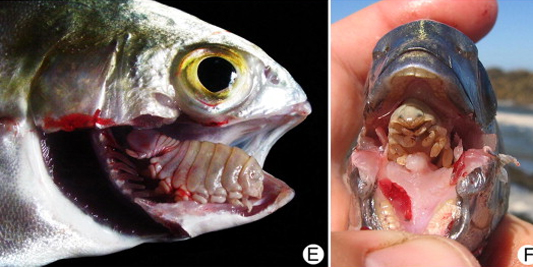 |
| Mouth dwelling isopods in different fish species. (Nico Smit, Int. J. Parasitol, 2014) |
Within the Atlantic croaker's (Micropogonias undulatus) gaping mouth, where its tongue should have been, instead sat far too many legs for any mouth, or fish. These legs came with eyes, too.An isopod from the genus Cymothoa had replaced the croaker's tongue. Females of this group of crustaceans migrate up from the fish's gills, pinch, and siphon off the blood supply to the tongue until the organ withers and falls off. They then attach themselves onto the remaining fleshy stub, continuing to feast on their captive's blood for years.
"[It] happens to be the only known case where a parasite functionally replaces a host's organ," the park workers shared on their Facebook page.
Mark Fisher, science director at Texas Parks and Wildlife explained that these parasites are quite common in some fish species, like the spotted seatrout. While he'd never before seen one in an Atlantic croaker (Micropogonias undulatus), one 2015 study found the isopods were relatively fond of this particular host.
While the parasite, which can reach up to 8 mm long (0.3 inches), doesn't seem to change feeding habits of some of the fish it infects, it can lead to a reduction in their growth, a 2013 study found.
The researchers suggested this may be due to respiratory stress produced by receiving less oxygen over the long term, because the massive parasite clogging the mouth doesn't allow the fish to take up and filter as much oxygen from the water. Others attribute this decline to the parasite's draining of nutrients.
These findings were specific to the C. borbonica species infecting the Trachinotus botla fish. We're not sure which species has infested the mouth of the Atlantic croaker, although C. excisa is thought to have high host specificity towards this fish. READ MORE...